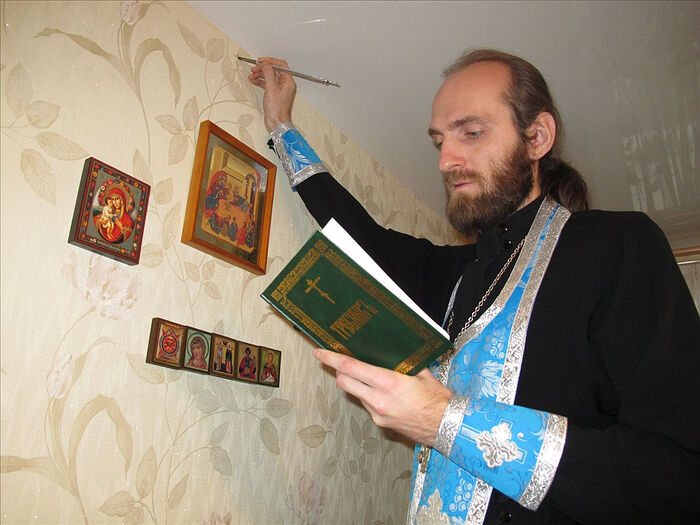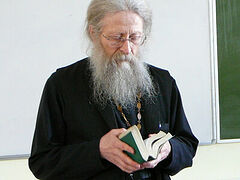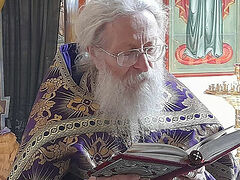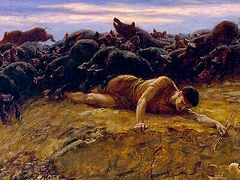Part 1: Christian Exorcism and Holiness
Part 2: Baptism, and Eight Steps to Casting Out Our Own Demons
Part 3: Possession vs. Psychiatry
Part 5: On the Holiness of the Christian Church
Question:
—Fr. Ilya Burmin. I have a question about Baptism—when someone was sanctified [by baptism] and chose to get on the path. But it often happens, people ask you to serve a funeral, and you ask, “Is he baptized?” “Yes.” “Okay. He didn’t die by suicide?”
But, after he was baptized, he never set foot inside a church. Who is he then? A layman, a parishioner? What do you call him?
Fr. Gennady:
—Let’s answer in two ways: formally and informally. Formally speaking, if someone hasn’t come to church on three consecutive Sundays, according to the Apostolic Canons, he has to be excommunicated from the Church. According to the Catechism of St. Philaret (Drozdov) from the nineteenth century, Whoever has not received Communion once in a year is not a Christian. I think we should explain these things to our flock.
Informally speaking, only God knows, and we have what we have. In our case, it is a hundred years of fighting with godlessness in our country. For seventy years, there was atheistic godlessness, while for the last thirty years—it is hard even to describe what kind of godlessness we endured. And since we have this godless generation, before we can deny them a funeral and everything else, we must excommunicate them from the Church. Later, as one excommunicated from the Church, he simply won’t be able to receive a church funeral.
Three Sundays away from the Church—excommunicate. We have this apostolic rule and we are allowed to excommunicate. So, yes, we don’t serve a funeral service for the excommunicated. But since we do not excommunicate them—and that is the right thing to do under the current state of affairs... Do you remember the number of people that the prophet Elijah once excommunicated? I don’t think he would take offense at us if we say that he excommunicated everyone but himself. He said to God, to God Himself, “I am the only one left.” God replies, “But there are seven thousand more.” The prophet didn’t notice those seven thousand. They didn’t stand out in any way. They all seemed to be under the yoke of Jezebel, all of that idolatry and wickedness. So, in order not to excommunicate these seven thousand, if a person never deliberately denounced God or the Church, or he never declared: “Priests or crosses not needed”; in other words, if he never formally excommunicated himself, or if the Church did not formally excommunicate him, then I think we have a reason to pray for him. His next step is to take a stand before the Judgment Seat of God. Our prayer doesn’t provide a pass to the Kingdom of Heaven. But we pray that the Lord grant him the Kingdom of Heaven. Fortunately, it is not we who will judge and decide, but Almighty God.
Question:
—I have often observed the practice of re-blessing dwellings, cars, etc. For example, a priest has consecrated a home and then says, “Contact me in a few months, we will need to bless it again.” I’ve never heard of this, but some say it’s necessary. How should we treat such instances?
Fr. Gennady:
—Fortunately, you would never learn of such things from my talks or lectures, because I never said or used such practices. After all, the consecration of a dwelling is done only once. It is still possible to justify and understand such instances when something extraordinary has happened, such as suicide, or if you rented an apartment that was blessed before. Say for example that you lived there at first but then moved out and rented it to tenants, and you know that outright fornication had occurred there. Now you are going to reside in that apartment again. I don’t want to go back to an apartment where fornication has occurred. Or, I don’t like the idea that a suicide was committed there. In such instances, you can justify a second blessing of that place. As for putting it into a regular practice... Are you adding on to the holiness of your apartment, like picking up speed as you drive in your car, or what? What is it for? We should live the spiritual life, instead of endlessly blessing an apartment or a car. Maybe someone else will provide a different answer, but you asked me. So here’s what I think.
Question:
—St. John of Kronstadt used to be summoned to pray in front of the icons in people’s homes. The priest visited people’s homes, and I find this practice very effective. Like a gardener, he should tend his garden. For example, someone has renovated their home, something in their lives has changed, and the blessing took place a long time ago; they want to have another blessing ceremony. They ask the priest to come and bless their home.
Fr. Gennady:
—I think we shouldn’t do the Rite of Blessing again. But, really, just come to pray there. Overall, we should privately pray with the flock more often. Not only during the services, such as Vespers, Matins, or Liturgy, but informally, in their homes. People value it greatly. As for John of Kronstadt, especially in the first half of the twentieth century, there used to be such a notion: “To act in the Kronstadt way.” A priest did it the “Kronstadt way.” St. John impressed his contemporaries so much, doing certain things in a truly unconventional manner, that a lot of priests simply tried to imitate him. I would put it this way: you don’t have to do it the “Kronstadt way.”
We imitate the saints—Therefore I urge you, imitate me (1 Corinthians 4:16), says the Apostle Paul. I truly understand how much it means for a believer when his priest comes for a visit and prays with them. It has a good effect on them. As long as you don’t end up building a cult around that priest; like, he prayed here and our icon looks different now, unlike other icons, etc. It is way too easy to fall into delusion.
And we often do not even look at the image; we have a very vague idea what a prototype is, but this particular object is something special. This cross is so special. In fact, all crosses depict Christ crucified. But no, this particular cross is miraculous, while that one sort of isn’t. We should avoid the temptation to translate it into the worship of sacred objects. It is not too far from idolatry. Isn’t it valuable for us when we receive an object from an elder—an epitrachelion or something else? All epitrachelions look the same, they were blessed using the same rite. We treasure it because we received it from that particular priest; we keep it as a special memento and we like it very much. It builds up piety and nourishes our sense of reverence.
The term “bishop” can in general be translated as “overseer.” He must oversee what is going on. We, as priests, must watch what is happening with our flock. Anyway, repair and re-sanctification… Well, I don’t know, I do not practice re-sanctification. Maybe someone has done it for the sake of reverence—I wouldn’t criticize them.
Question:
—Say that you were called to do a re-sanctification. You come to the apartment, you’ve been invited. Do you turn around and leave?
Fr. Gennady:
—Why should I do that? Generally, you should never turn around and leave. We are sometimes tied up in rituals. The apostles had no rituals at all. Since you’ve come, say the prayers, sprinkle the place with holy water, anoint the foreheads of its owners with holy oil, and just pray with them. Give honor to the Word of God, ask for God’s blessing. Why should we turn around and leave? Again, we aren’t sticklers for details.




